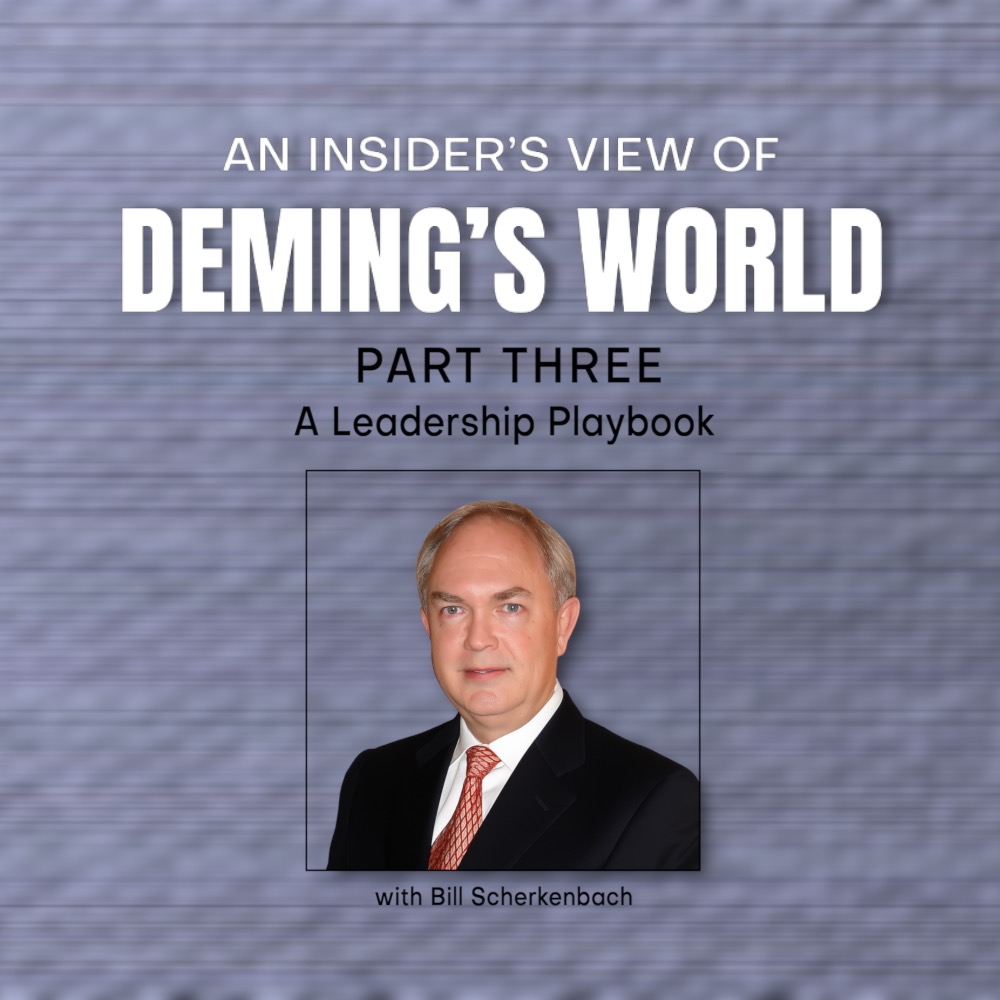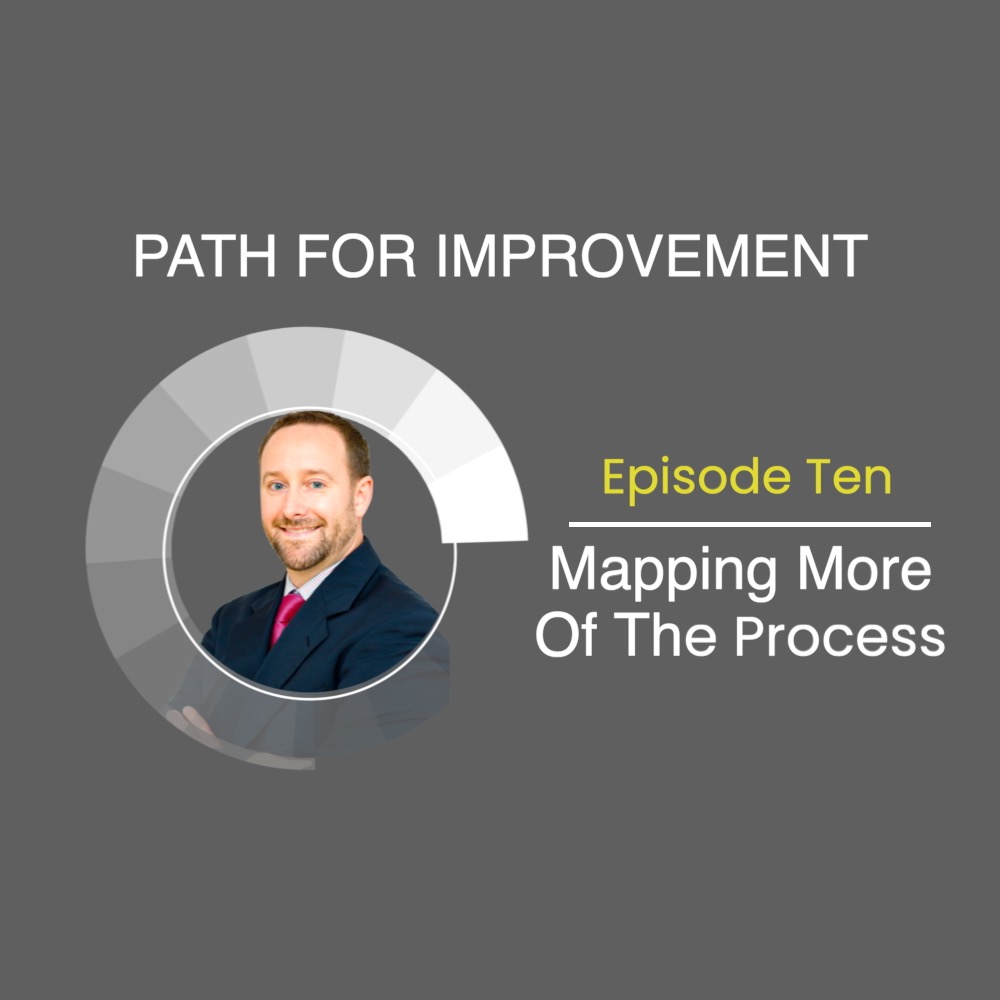Do Specification Limits Limit Improvement? Misunderstanding Quality (Part 12)
Description
Are your specification limits holding you back from improving your products and services? Should you throw out specifications? What does Stephen Hawking have to do with it? In this episode, Bill Bellows and host Andrew Stotz discuss specifications and variation.
TRANSCRIPT
0:00:02 .5 Andrew Stotz: My name is Andrew Stotz, and I'll be your host as we dive deeper into the teachings of Dr. W Edwards Deming. Today, I'm continuing my discussion with Bill Bellows, who has spent 31 years helping people apply Dr. Deming's ideas to become aware of how their thinking is holding them back from their biggest opportunities. Today is episode 12, and the title is Do Specification Limits Limit Improvement. Bill, take it away.
0:00:31 .4 Bill Bellows: Hey, Andrew. How's it going? All right.
0:00:33 .8 Andrew Stotz: Great. Great to have you back and great to see you. For those that are just listening, you can watch the video on DemingNEXT. But for those listening, Bill looks handsome, full of energy, ready to go, and it's my 8:30 in the morning in Bangkok, Thailand. So let's rock Bill.
0:00:56 .3 Bill Bellows: So. I spoke recently to one of the folks I'd met on LinkedIn that have listened to our podcast and took the offer to reach out and we now talk regularly. And I just wanna say I've gotta, before we get to some, the story behind the title, I wanted to share, a heads up. And if anyone would like a copy of this article that I wanna, take some excerpts from, then just reach out to me on LinkedIn and ask for a copy of the article. The article's entitled 'A Brief History of Quality,' and there's three parts. So it's about 10 pages overall, and it was published in 2015 in the Lean Management Journal, which I don't believe still exists. I was writing articles at the end once a month for this journal, I think based out of the UK.
0:02:04 .3 Bill Bellows: I think there was a manufacturing magazine that still exists and had this as a special topic and my interest was bringing Dr. Deming's ideas, to the Lean community, which is why it was a Lean Management Journal, so the article was entitled 'Brief History Equality.' And so I wanna get to those topics, but when I was reading the article, reminding myself of it, I thought, oh, I'll just share this story online with Andrew and our audience. And so here I'm just gonna read the opening paragraph. It says, "several years ago, I had the opportunity to attend an hour-long lecture by Stephen Hawking," right? So the article was written in 2015. So the presentation by Hawking would've been maybe 2012, 2013. And back to the article, it says, "he, Hawking, returns to Pasadena every summer for a one-month retreat, a ritual he started in the 1970s, several thousand attendees sitting in both a lecture hall and outdoors on a lawn area complete with a giant screen were treated to an evening of reflection of the legendary Cambridge physicist."
0:03:14 .3 Bill Bellows: And I'll just pause. I have friends who work at JPL and they got me seats, and they got me an inside seat in the balcony, front row of the balcony, but they had big screens outside. I mean, it was like a rock concert for Stephen Hawking, right?
0:03:34 .3 Andrew Stotz: That's amazing.
0:03:34 .9 Bill Bellows: Oh, it was so cool. Oh, it was so cool. So anyway, "his focus was my brief history offering us a glimpse of his life through a twist on his treatise, A Brief History of Time. His introspective presentation revealed his genius, his humility, his search for black holes, his passion for life, not to mention his dry sense of humor. It ended with questions from three Caltech students, the last of which came from a postdoc student, an inquiry Hawking had likely tackled many times before."
0:04:06 .6 Bill Bellows: So realize he's answering the questions through a voice activated thing. And it appeared that the questions were, his answers were prerecorded, but they're still coming through a device that is a synthesized voice. But I get the impression that he knew the questions were coming, so we in the audience were hearing the questions for the first time. But he had already answered the questions. So anyway, it ended with questions. There was an undergraduate student, a graduate student, then a postdoc, and I said, "the last of which came from a postdoc student, an inquiry Hawking had likely tackled many times before. And the student relayed the story of an unnamed physicist who once compared himself to both Isaac Newton and Albert Einstein." So this unnamed physicist compared himself to Einstein and Newton each placed on a scale of 1 lowest to 10 highest. "With this context, Hawking was asked where he would rank himself."
0:05:22 .0 Bill Bellows: So this physicist said, oh, you know, Andrew, I see myself as this. And so the guy relays the story, and he says to Hawking, so given this other physicist said this, where would you rank yourself? "Well, I do not recall the relative rankings posed in the query. I'll never forget Hawking's abrupt reply. He says, "anyone who compares themselves to others is a loser." And I found online that he was, that commentary, this was not the first time he said that.
0:06:04 .9 Andrew Stotz: Right.
0:06:06 .5 Bill Bellows: And I just thought, oh, anyone who compares himself to others is a loser. And then the end of the paragraph is "in reference to Dr. Deming," Andrew, "variation, there will always be. So can't we just get used to variation?" So the title, are you in favor? No, no, no, no. That was last time. Are you in favor of improving the quality was number 10. Number 11 was to improve quality, don't measure quality. For 12, the specification limits limit improvement.
0:06:46 .9 Andrew Stotz: Now, if that was true, first of all, that would be a little scary, 'cause we spend a lot of time working on specification limits. There's a lot of people working on that.
0:06:55 .4 Bill Bellows: But here's what's behind the title. In 1995, I was invited to speak, not for the first time, but for the first time I ever spoke to an audience of the American Society of Quality. It was a San Fernando Valley chapter. I forget the number. I've spoken there many, many times over the years, but this is the first time I ever spoke to quality professionals as opposed to project managers or Society of Manufacturing Engineers. I was there with my wife. There's dinner, then after dinner in the next room, and the chairs were set up, theater style, that'd be 70, 80 people. And I was talking about what I would, I mean, things I still talk about, I talk about new things, to have new things done. But the big thing I was trying to get across the audience is, the difference between meeting requirements, which in this series, we call it acceptability versus desirability, which is, I want this value, I want this professor, I want to date this person. And so I was relaying that concept to that audience. And the question I asked that night was do specification limits limit improvement?
0:08:31 .0 Bill Bellows: And there was a guy about seven rows back, and I built up to that. That wasn't the opening thing, but what I was really pushing on was a focus on Phil Crosby's goal of striving for zero defects. And, then what? Once you achieve that, then what? And we've talked about the doorway and that's like the door is closed, we get up to the doorway and we've achieved zero defects. And, what we've talked about is going through the doorway and the attitude is, well, why open the door? I mean, don't open the door, Andrew. There's a wall on the other side of that door, Andrew. So it might be a door, but everybody knows there's a wall behind it, and I was poking at that with this audience, and prepared to show them the value proposition of going through that.
0:09:34 .0 Bill Bellows: So anyway, I remember I got to the point of asking, do specification limits limit thinking about improvement or something like that. And a more senior gentleman, about seven or eight rows back, and fortunately, he was seven or eight rows back, fortunately, because he stood up and he says, "Are you saying we don't need specification limits?" There's a lot more anger in his voice. And I said, "No," I said, "I'm saying I think they limit our thinking about improvement." And, but he was really upset with me, and I was deliberately provoking because again, you and I have talked about, how can we inspire through this podcast and other podcasts that you do with the others, to get people to think about the possibilities that Dr. Deming shared with us. And it's not believing that there's a door that you can't walk through. You open the door and there's an opening and you can go through. There's a lot more going on there. So anyway, so I had prepared them. The whole reason for being there
























